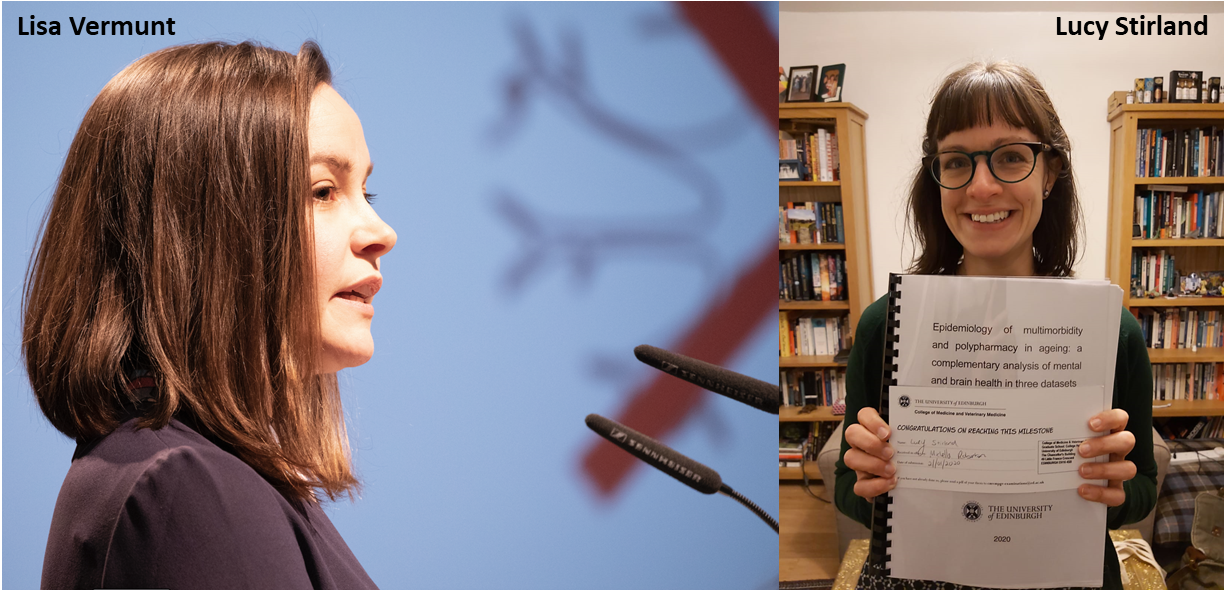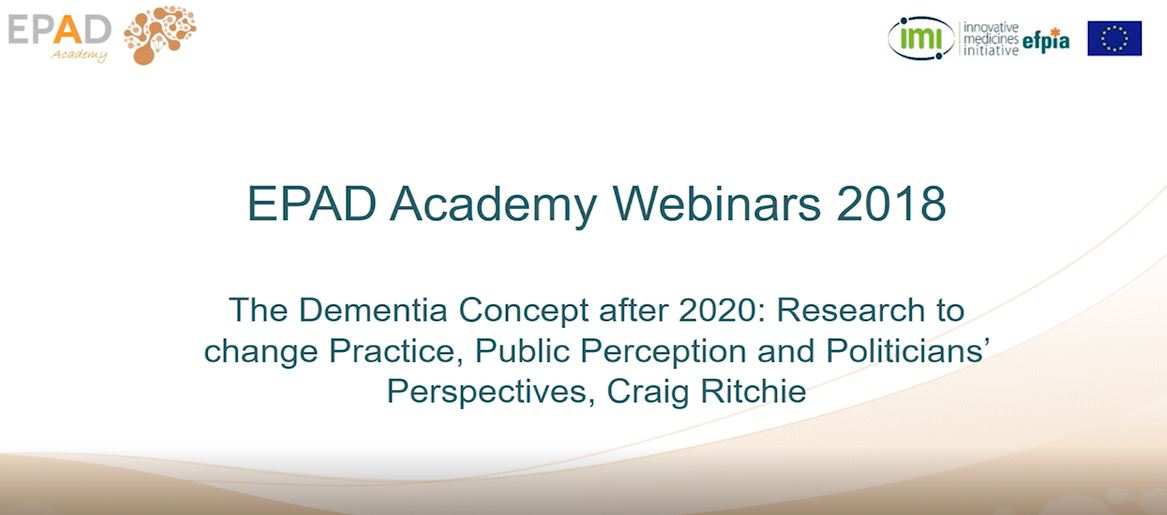The EPAD consortium wishes to congratulate Lisa Vermunt and Lucy Stirland, two EPAD fellows, on successfully defending their PhD thesis in March 2020. It was two great days and we are proud of their contributions and all the hard work that Lisa and Lucy have put in – very well deserved! We wish them both the best in their future endeavours! Here is a chance to get to know them and their work a bit better.
On 13 March 2020, Lisa Vermunt successfully defended her PhD thesis entitled “Secondary prevention for Alzheimer disease – timing, selection and endpoint of clinical trials” at the VU University in Amsterdam (Netherlands). This work was conducted in the context of the EPAD project and was the first EPAD PhD to be completed including EPAD content. Lisa was supervised by Prof Philip Scheltens, Pieter Jelle Visser and Betty Tijms. In this thesis, Lisa investigated the duration of the Alzheimer’s disease stages. As a second independent project, she studied the prognosis of those reverting from mild cognitive impairment. Within EPAD, she studied the recruitment of individuals without dementia for dementia prevention research. Finally, she visited Washington University in St. Louis (US) to study brain connectivity in the DIAN cohort, which consists of families in which autosomal dominantly inherited Alzheimer’s disease occurs. The findings in this thesis improve the insight in the disease course of Alzheimer’s disease, including the pre-dementia period. The findings provide new prognostic information, and can be applied to improve the design and facilitate the execution of secondary prevention trials in Alzheimer’s disease. The published parts of the thesis can be found here.
Lucy Stirland defended her thesis on 16 March 2020 at the University of Edinburgh (UK). Her thesis is titled “Epidemiology of multimorbidity and polypharmacy in ageing: a complementary analysis of mental and brain health in three datasets”. Her thesis was supervised by Graciela Muniz Terrera, Tom Russ and Prof Craig Ritchie. Her thesis focused on the mental and brain health of people with multiple physical conditions. Most people with one long-term condition have more than one illness, so it’s important to study combinations of diseases. Lucy looked at data from three sources: EPAD, the PREVENT Dementia study and routinely collected data from the Scottish National Health Service. A chapter in this thesis was based on the EPAD V500.0 analysis and has been published already and is available here. The full text of her thesis will shortly be available. Her PhD was funded by the Medical Research Foundation and Medical Research Council through PsySTAR, the Psychiatry: Scottish Training in Academic Research programme.
EPAD involves many academic, industry and SME partners. What has been your experience as a young researcher of working on such a large public-private partnership?
- Lisa: I consider it to be a uniquely wonderful experience to have been able to work with a diverse group of experts in Alzheimer research. Naturally I was aware of what I was jumping into, but of course I could not anticipate what the job would be like. EPAD researchers have literally expertise on every detail, from project management to biomarkers. Although, I am sincerely disappointed that the EPAD Cohort cannot continue anymore, I am convinced that all study sites will remain sufficiently creative to keep following the participants over time. Also on a cultural level I have learned a lot about Europe – and all the nuances of the different cultures. I could really recommend it to all starting researchers!
- Lucy: During my PhD, I gained experience in analysing data from different research studies. It was great to use information collected from the EPAD Cohort Study because there were so many different measurements taken. I was very fortunate that my primary PhD supervisor, Dr Graciela Muniz Terrera, co-leads the EPAD WP2 Work Package “Statistical/Methodology” so she was always on hand to provide guidance. I also enjoyed working with other members of the team who shared their knowledge with me.
What were your main tasks within the EPAD project?
- Lisa: As member of Work Package 3, our main responsibilities were to set up and maintain the EPAD Register. My work entailed a lot of reaching out to all the project partners. A second task was to set up the Amsterdam study site and work as site coordinator and the physician for the Cohort study. As I became more focused on writing and data analysis, most EPAD Cohort tasks were assigned to be carried on by other colleagues. It has been nice to see the participants during study visits as a study physician and chat with them about their motivations, their lives, and experience in the project.
What have been some of your major research findings?
- Lisa: One of the most important developments, I believe, has been that we made a model that improved on previous models estimating the duration of the clinical Alzheimer’s disease stages. Another really interesting part was that we could confirm that grey matter connectivity is changed in autosomal dominant Alzheimer’s disease in a similar way as in sporadic Alzheimer’s disease. In addition, decline of these connectivity measures worsened as the disease progressed over time, which provides an important validation for this imaging marker of disease progression in Alzheimer’s disease.
- Lucy: I found links between having several conditions and having depression. In the EPAD cohort, I found that the more conditions people had, the less likely they were to have a positive result for amyloid, a test that suggests higher risk of dementia. This was surprising as we know that people with dementia usually have several other diagnoses. I concluded that the interaction between multiple conditions and dementia was likely due to lots of reasons rather than amyloid alone.
You recently finished your PhD. Which career track are you pursuing at the moment?
- Lisa: I am continuing my scientific career with a postdoc position, started a few months ago in the lab of prof. Teunissen of neurochemistry at Amsterdam UMC in the Netherlands. Here I will continue to work on disease modelling, including proteomic data now as well. With this approach we wish to find new prognostic markers and better understand the disease. Apart from that, I am maintaining physician tasks, seeing participants and patients in our Alzheimer center on a regular basis. My plan is to stay in Alzheimer’s disease research at least until we found an effective treatment for the secondary prevention dementia due to Alzheimer’s disease.
- Lucy: I am an old age psychiatrist and have returned to full-time clinical work since finishing my PhD. I currently work in liaison psychiatry, caring for patients’ mental health while they are in hospital with physical illnesses. Longer term, I aim to pursue a clinical academic career, splitting my time between research and clinical work.




